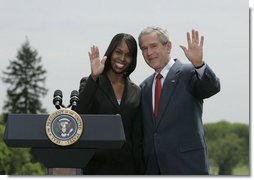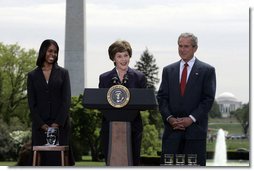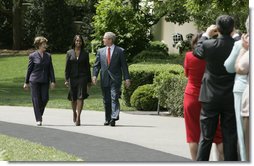
- Afghanistan
- Africa
- Budget Management
- Defense
- Economy
- Education
- Energy
- Environment
- Global Diplomacy
- Health Care
- Homeland Security
- Immigration
- International Trade
- Iraq
- Judicial Nominations
- Middle East
- National Security
- Veterans
|
Home >
News & Policies >
April 2006
|
For Immediate Release
Office of the Press Secretary
April 26, 2006
President and Mrs. Bush Meet with the 2006 National and State Teachers of the Year
The South Lawn
![]() Fact Sheet: The National Teacher of the Year: A Commitment to Education Excellence
Fact Sheet: The National Teacher of the Year: A Commitment to Education Excellence
![]() In Focus: Education
In Focus: Education
1:46 P.M. EDT
MRS. BUSH: Congratulations, Kim. And congratulations to all of our State Teachers of the Year. As we gather today to celebrate your accomplishments, we also honor the excellent teachers across America for their hard work and dedication. Teaching is a challenging job, and it becomes difficult when teachers and students are also facing personal trials in their lives outside the classroom.
 Today, I'd especially like to thank the teachers along the Gulf Coast who
are working hard to make sure that children who lost their homes, their
friends, and their families can find comfort in their schools. Caring and
devoted teachers provide children with a stable, nurturing classroom
environment, even as they're rebuilding their own homes and lives.
Today, I'd especially like to thank the teachers along the Gulf Coast who
are working hard to make sure that children who lost their homes, their
friends, and their families can find comfort in their schools. Caring and
devoted teachers provide children with a stable, nurturing classroom
environment, even as they're rebuilding their own homes and lives.
Hurricanes Katrina and Rita also forced thousands of school children and their families to leave the Gulf Coast and to start new lives in other cities. Across America, these children have been embraced as new members of new communities, and have been welcomed by new schools.
So today, I also want to thank the teachers throughout the United States who have opened their hearts and their classrooms to the children of the Gulf Coast. These teachers, and the outstanding teachers who are here today, remind us how teaching is the greatest public service and why teachers deserve our respect and our admiration.
The great American historian and writer, Henry Adams, once wrote, "A teacher affects eternity; he can never tell where his influence stops." And that's one of the best parts about teaching, being surprised by the effect you have on your students. Sometimes, the child everyone in town has pegged as a lifelong jokester goes on to do something great -- (laughter) -- thanks to his teachers. He might even become President of the United States. (Laughter and applause.)
Now, I'd like to introduce someone who probably surprised a lot of his teachers. Ladies and gentlemen, my husband, President George Bush. (Applause.)
THE PRESIDENT: I was going to say, thank you, Laura, for those kind remarks. (Laughter.) Please be seated. Thank you all. Welcome.
This is one of the great afternoons for Laura and me. We love to recognize our teachers. We really appreciate you coming. Actually, this is an annual event started by Harry Truman. And I'm glad to be a part of a tradition here at the White House, saying thanks to our teachers.
I admire teachers and like teachers so much, I married one. (Laughter.) Laura is a great advocate for literacy and a strong supporter for America's teachers, and I'm really proud to have her by my side during these unbelievable times and this great experience of serving her country -- other than being a fine introducer. (Laughter.)
The thing I like about teaching is teaching is such an optimistic profession. I know when teachers look out at their classrooms, you see more than a child at play or at study. You're able to see a child with big dreams and big hopes. You see future doctors and scientists and entrepreneurs and inventors, and I hope you see even a teacher or two.
 You dedicated your lives to the formation of young minds. You're giving
our children the skills they need to succeed in life, and equally
important, the courage and the drive to realize those dreams. Our nation
is grateful for your hard work. We appreciate what you do, and we are
honored you're here at the White House.
You dedicated your lives to the formation of young minds. You're giving
our children the skills they need to succeed in life, and equally
important, the courage and the drive to realize those dreams. Our nation
is grateful for your hard work. We appreciate what you do, and we are
honored you're here at the White House.
I want to thank our Secretary of Education, Margaret Spellings. She's been a long time friend. She believes strongly in the classroom teacher, and she believes in the potential of every child.
I'm pleased to recognize Senator Sam Brownback, for the state of Kansas. Welcome. I'm glad you're here. And his wife, Mary. Thank you for coming. As well as Congressman Dennis Moore from Kansas, and Stephene. Thank you all for taking time to honor the teachers who are here.
I appreciate the National Teacher of the Year Finalists: Sam Bennett from Florida. Say hello to the Governor. (Laughter.) Ron Poplau, of Kansas -- no wonder you all are here. And Susan Barnard, of Washington state. We're really glad you're here. Congratulations on setting such a fine example. (Applause.)
Everybody here has been introduced to Kim Oliver, but you haven't met her parents, Vincent and Veronica. Thank you very much. (Applause.) Brothers, cousins and significant other. (Laughter.)
I want to thank all the Teachers of the Year from around our country who are here. I really -- Laura and I really enjoyed having our picture with you. It's just a brief moment to say thanks. But nevertheless, it's thanks from the bottom of our hearts. And it really means a lot you're here.
I thank Dr. Tom Houlihan, who is the executive director of the Council of Chief State School Officers. That's one of the sponsoring organizations. Thank you for your service, Tom.
Margery Mayer, of the Scholastic Education, Scholastic Inc. I want to thank Margery for being here. That's also a sponsoring organization of this event.
Kathleen Murphy is the president of ING is here with us, as well as Tom Waldron, who is the executive vice president. These are the sponsoring groups of this important occasion.
I also want to thank the chief state school officers who are with us. Good to see you all. Nice going. Hiring and promoting good teachers is a really important part of your job. I want you to know that we know that being a teacher is difficult work. It's a hard job. It's a job that requires compassion and determination and extraordinary patience. And, as Laura hinted, or maybe didn't hint, I was probably one of those kind that tested your patience. (Laughter.)
 You're helping young people to learn the basics of reading and writing and
adding and subtracting. You're serving as mentors, and probably most
importantly, as role models. You help kindle young imaginations, and you
inspire a love of learning. It's a pretty significant job description,
when you think about it. And the teachers we honor here today are
excelling at that job.
You're helping young people to learn the basics of reading and writing and
adding and subtracting. You're serving as mentors, and probably most
importantly, as role models. You help kindle young imaginations, and you
inspire a love of learning. It's a pretty significant job description,
when you think about it. And the teachers we honor here today are
excelling at that job.
Your daily efforts help young Americans grow into successful adults. In other words, you're building the future for the country. We ask a lot of our teachers and we owe you a lot in return. Education is my top domestic priority. And when I first came to office, I worked with members of both political parties -- believe it or not, it's possible here in Washington to occasionally do that -- to increase funding from the federal level, but also to pass the No Child Left Behind Act. The spirit of the No Child Left Behind Act basically says society has a deep obligation to challenge the soft bigotry of low expectations, that we believe every child can learn, and therefore, we believe it makes sense to determine whether or not every child is learning, and if not, there ought to be extra help so that no child in our society is left behind.
We're beginning to see good results, thanks to our nation's teachers. The 2005 Nation's Report Card showed America's 4th graders are posting the best scores in reading and math in the history of the test. African American and Hispanic fourth-graders set records in reading and math last year. America's 8th graders earned the best math scores ever recorded. Eighth-grade Hispanic and African American students achieved their highest math scores ever. We're making really important strides toward closing an achievement gap in America. And I want to thank our teachers for your hard work. (Applause.)
There's more work to be done, obviously. I've recently launched the American Competitiveness Initiative, which will help our students do better in math and science. We need to train 70,000 high school teachers to lead AP courses in math and science. I know we've got some AP teachers here, and I want to thank you for that.
We need to bring 30,000 math and science professionals into our classrooms to send a message to our children it's okay to be a mathematician or a scientist -- as a matter of fact, it's cool. We want to make sure that we help students who struggle with math get extra help to make sure that -- to make sure they have a chance to be able to earn the high-wage jobs of the 21st century. If we ensure that America's children have the skills they need to succeed in life, we will make sure America succeeds in the world.
Improving the quality of education for young Americans requires good laws and good policies, but ultimately it depends on good teachers. And that is why we're here, on the South Lawn, to honor really good teachers.
The Teacher of the Year, Kim Oliver, teaches Kindergarten at Broad Acres Elementary School, in Silver Spring, Maryland. Broad Acres is Montgomery County's highest poverty school, a place where 90 percent of the children qualify for federally-subsidized meals, and about 75 percent have parents who do not speak English at home.
It's a school filled with the kind of students that inspired Kim Oliver to become a teacher. Kim decided to become a teacher at a young age. It's really interesting for teachers to hear what she said. She said, "As a young child, I loved and admired my day care teacher, Mrs. Chandler. I wanted to be just like her. Mrs. Chandler made me feel special, as if I were the only child in her class."
Kim Oliver had many friends growing up who came from unstable and impoverished homes. She says, "I watched so many of my friends live up to the low expectations that were set for them. To this day, I find myself wondering, what if my disadvantaged friends had 12 years worth of Mrs. Chandlers in their lives?" Kim went on to say, "I chose to become a teacher to motivate and inspire the neediest students, who many have written off, and let them know they can achieve and succeed in life regardless of what the statistics may show."
I love that attitude. I think you're beginning to get the drift of why she's the teacher of the year. When Kim Oliver arrived at Broad Acres in 2000, the school was threatened with forced restructuring by the state as a result of poor academic performance. Ms. Oliver took a leadership role at the school. That's what good teachers do, they take the lead. She became a teacher leader, and helped lead a collaborative effort to improve the curriculum, instruction and assessment. She helped establish instructional planning sessions and formal procedures to examine student work and improve student performance.
She noticed that many parents at the school lacked the language skills to be able to read to their children and to be able to help with their school work. And so she and her colleagues purchased cassette players and recorded books on tape for the students to take home and share with their families, which made it a lot easier for parents who struggle with English to help their children.
Kim Oliver also organized a regular "Books and Supper Night," where families could check out books from the library and read together before sharing a dinner, which fostered learning and family involvement in their children's education. She knows what good teachers know, if you can get the parents involved in the child's education, you have a much better chance of succeeding. She set high expectations. Good teachers set high expectations. She provided needed assistance. She involved families, and she helped turn that school around.
Within two years of her arrival, kindergarten students at Broad Acres were mastering early reading skills at higher rates than other schools in the district. After three years, Broad Acres students were meeting or exceeding all requirements of the No Child Left Behind Act. There were dramatic increases in reading and math scores for the school's 2nd graders.
The Superintendent of Schools in Montgomery County says this about the impact Kim Oliver has had: She has a rare gift for touching hearts and minds, inspiring in her students to aim high and believe in their potential. A Broad Acres parent says she knows how to talk to the children so they will listen. And all her students know that she cares about them. She made them all feel like they were smart and could learn anything. One of her colleagues says, "When you walk into Ms. Oliver's classroom, one cannot help but notice that this is a special place." She is dedicated to her school community and committed to excellence, and she has been an instrumental force in improving student achievement at her school.
Kim says the reason her students are achieving is simple: "I have high expectations for each of them. I teach them that they can accomplish anything with hard work and persistence." Kim Oliver understands that the key to helping children succeed is fighting the soft bigotry of low expectations. When a teacher believes that a child can learn, it's amazing what happens -- a student believes that he or she can learn.
America is blessed to have teachers like Kim Oliver. We're blessed to have teachers like all those who are gathered here at the White House. We thank you for the love and devotion you've shown our children each day.
May God continue to bless your work, and may God continue to bless our country. Thank you for coming. (Applause.)
END 2:03 P.M. EDT


